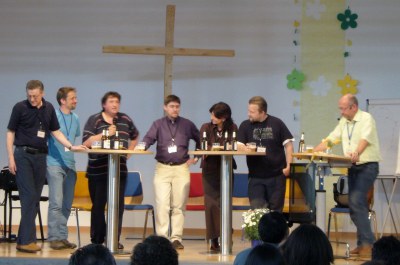The church has been (rightly) accused of abuse of its power in the past. How much of this is a particular failing of the church, and how much is due to other factors?
After its founding around 30AD, the church suffered persecution for some time, but grew in influence, finally becoming the state religion of the Roman Empire. Its influence continued to grow, and outlasted the Roman Empire itself; in the Middle Ages, the Catholic Church was probably the most influential force in Europe. As its power and influence grew, so did the abuse of that power; the Inquisition and Counter-Reformation are prime examples, as is the practise of the Indulgences.
The Catholic Church persecuted the Reformers, but these, after successfully establishing their teaching and structures, in turn persecuted subsequent groups such as the Anabaptists.
That’s truly a poor record, and it is quite understandable that it led to increasing secularisation. Even after increasing separation of the church and state, the church retained a strong influence on local levels; the prevailing views and behaviours are today often viewed as hypocrisy and proof of a negative influence from Christianity or religion in general.
Let’s look at more recent developments in the secular West:
- in Britain, it is increasingly difficult to do anything in an inhabited area without being filmed by a surveillance camera, and it was recently divulged that the Border Agency has been testing a database aimed to capture all travel to and from the UK since 2004, and plans to register 95% of travel by December 2010. The Government is also working on tracking mobile phone calls, e-mails and web sessions.
- the German Government has similar plans for mobile phone calls and web sessions (based on EU legislation), and is currently proposing enforcing filtering of web content, currently targeting paedophilia.
- the US has been registering foreigners entering and leaving the country for several years, and has increased its efforts since September 11th 2001, now requiring fingerprint and iris scans on entry, and details (name, credit card, dietary preferences etc.) of all passengers travelling to the US before they arrive. The Customs officials may confiscate electronic equipment including laptops and mobile phones without prior reason, and travellers are legally required to provide access to all information contained on the device.
- the current economic/bank crisis is giving rise to calls for more regulation and state control of the financial system – although the US had access to all transfers in the SWIFT interbank network for several years.
Those are only the first examples which come to mind. The reasoning behind the surveillance and legislation is always increased security and crime prevention, both legitimate concerns for a state system. However, the developments all point in the direction of repression of non-conformist activity, much as the church is accused of doing in the past. Dictatorships do the same, but generally in a much shorter period; the rise of a dictator is generally coupled with widespread dissatisfaction with the existing system, but the dictator then cements his power through repression of dissenting opinions.
I’m beginning to think that the criticism of the church’s role in the past is both justified and misdirected! Misdirected, because the criticised behaviour is apparently endemic in an established and generally accepted system; justified, because the behaviour is basically evil, and the church is called to be different. (Of course, in order to be different, the church must effectively disciple new believers. But that’s another story.)
 We’ve just returned from Romanshorn, where we attended (and helped at) the
We’ve just returned from Romanshorn, where we attended (and helped at) the 